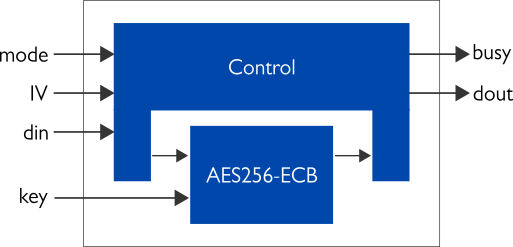The roots of Advanced Encryption Standard (AES) go back to 1999, when two Belgian cryptographers Vincent Rijmen and Joan Daemen designed a new block cipher and decided to call it Rijndael, a combination of their surnames. Rijndael was submitted as a proposal to the then ongoing selection process by the U.S. National Institute of Standards and Technology (NIST) to find a replacement for the aging Digital Encryption Standard (DES).
After a rigorous and open selection process a subset of Rijndael ended up as the winner, and was renamed Advanced Encryption Standard in 2001 and formally defined in FIPS-197 standard.
Ever since its standardisation, AES has rapidly increased its usage and has become the de facto globally used block cipher. Importantly, block ciphers require a mode of operation to provide information security, and several modes of operation have been standardised and cryptanalysed over the years.
Versatile AES IP Core
Xiphera extends its AES portfolio by launching XIP1123B, a balanced versatile IP core supporting AES with 256-bit key length in five modes of operations (ECB, CBC, OFB, CFB, and CTR). XIP1123B is primarily targeted for linerates of a few Gbps, and the mode of operation can be dynamically changed by the user. If support for only a subset of the modes of operations is required, the IP core can be customised to meet the exact customer requirements.

AES was originally standardised for 128-bit, 192-bit, and 256-bit key lengths, but due to approaching quantum computing threat – specifically so-called Grover’s algorithm – Xiphera has decided to focus on the 256-bit key length versions of AES in current and future product launches. “By focusing on the 256-bit key length, we make sure that our solutions remain secure even in the era of quantum computing” says Kimmo Järvinen, Co-founder and CTO of Xiphera.
For more information, visit the product pages for XIP1123B. You can also view and download the full product brief.
Read more about Advanced Encryption Standard and see more of the solutions of this product family from our Block/stream ciphers pages. Don’t hesitate to contact us at sales(at)xiphera.com.




